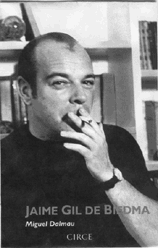There is no sex life in the grave
These days I am reading a recent biography of the Spanish poet Jaime Gil de Biedma (1929-1990), written by Miguel Dalmau: Jaime Gil de Biedma. Retrato de un poeta, Barcelona: Circe, 2004. (I have investigated the classical influence on Biedma's poetry, that is why I am interested in his biography).

In the prologue to this biography, one can read a quotation of a line, supposedly belonging to a poem by W. H. Auden (1907-1973):
"El sol brillaba sobre su cabeza romana y la memoria le trajo uno de aquellos versos de Auden que tanto le agradaban:
...No hay vida sexual en la tumba." (p. 10)
"The sun shone upon his Roman head, and he remembered one of those lines by Auden that pleased him so much:
...There is no sex life in the grave." [my translation]
After a hard search through Internet, looking for a poem by Auden including the line "There is no sex life in the grave" or something similar, I have found the following text:
Actually, the tone of this poem sounds too vulgar and matter-of-fact to me, and I do not really consider it to be by Auden. It seems that the poem was cited (as an epitaph) and falsely attributed to Auden in Luchino Visconti's film Conversation piece (original title: Gruppo di famiglia in un interno) (1974). If any of my readers knows something more about this matter, I would greatly appreciate his/her information.The moment
If you see a fair form, chase it
And if possible embrace it,
Be it a girl or boy.
Don't be bashful: be brash, be fresh.
Life is short, so enjoy
Whatever contact your flesh
May at the moment crave:
There's no sex life in the grave.
Now, the subject-matter of the poem is a specific variation of the famous carpe-diem topos: "enjoy life and sex, because there is no sex life in the grave (that is, after death)". Of course, the topos has classical roots. I remember a clear parallel passage in an epigram by the Hellenistic poet Asclepiades of Samos, a contemporary of Theocritus (c. 320 BC). This epigram is Palatine Anthology 5.85. Due to difficulties in writing with a Greek font, I will only copy here a literary English translation by Andrew Lang (written in 1888):
To a GirlThe same topos is developped in the famous poem "To his coy Mistress", by Andrew Marvel (1621-1678). We read in lines 21-40:
Believe me, love, it is not good
To hoard a mortal maidenhood;
In Hades thou wilt never find,
Maiden, a lover to thy mind;
Love's for the living! presently
Ashes and dust in death are we.
But at my back I alwaies hearTo conclude, I suspect that the poem "The moment", attributed to Auden in Visconti's film, is not really by Auden. And it is likely that its anonymous author (maybe Visconti himself or a scriptwriter of the film) was imitating a section of "To his coy Mistress" by Marvel.
Times winged Charriot hurrying near:
And yonder all before us lye
Desarts of vast Eternity.
Thy Beauty shall no more be found;
Nor, in thy marble Vault, shall sound
My echoing Song: then Worms shall try
That long preserv'd Virginity:
And you quaint Honour turns to dust;
And into ashes all my Lust.
The grave's a fine and private place,
But none I think do there embrace.
Now therefore, while the youthful hew
Sits on thy skin like morning [dew],
And while thy willing Soul transpires
At every pore with instant Fires,
Now let us sport us while we may;
And now, like am'rous birds of prey,
Rather at once our Time devour,
Than languish in his slow-chapt pow'r.
P.S. (10th November, 2007). I have written a new entry on this literary topos, where I explain that yes, the poem is by Auden.
Labels: Jaime Gil de Biedma, tópicos literarios, Tradición Clásica






3 Comments:
Hace tanto que me acompañan esos versos de Auden...
Could it be that Visconti himself wrote this poem and decided to attribute it to W.H. Auden? Or that Auden personally gave it to the italian director, so it never came to be publicly known as one of his works?
I was also always in doubt about the authorship of this poem, because there seems to be no trace of it in Auden's works I found on the web (from official sites).
Congratulations for your research on the misterious poem and on the theme of sex and death! And congrats for your blog, it is rather interesting and well written!
In an article from a 1975's edition of "The new yorker", Paul Kael wrote: W. H. Auden is quoted in review of Luchino Visconti's new film "Conversation Piece". Writer says we get the film's sexual rationale when one of the characters recites Auden's "last poem:" "When you see a fair form, chase it And if possible embrace it, Be it a girl or a boy. Don't be bashful: be brash, be fresh. Lif is so short, so enjoy Whatever contact your flesh May at the moment crave: There's no sex life in the grave" It's from Auden's and Chester Kallman's masque "The Entertainment of the Senses."
Post a Comment
<< Home